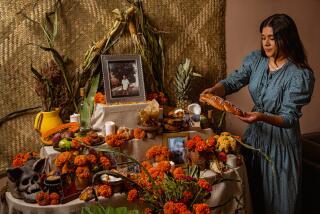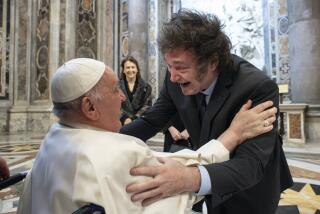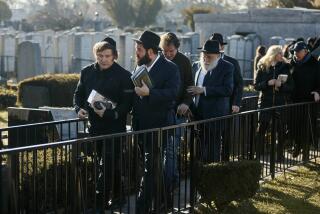Church, Government Discourage Belief : Argentine ‘Miracle’ Cult Is Big Business
- Share via
VALLECITO, Argentina — Water and shade now abound where a parched Deolinda Correa supposedly collapsed under a boiling sun and passed on into popular immortality.
A dozen water-filled tank trucks arrive daily at the spot to irrigate 5,300 trees spread over a man-made oasis fringed by two restaurants, a gasoline station, souvenir stands, a campground and--soon--a 30-room hotel.
The cult of “La Difunta Correa,” now in its 151st year, is big business in this desolate stretch of desert near northern Argentina’s Andean foothills.
Church Disapproves
Despite occasional financial scandal and the Roman Catholic Church’s disapproval, hundreds of thousands of pilgrims come each year to give thanks--and lots of money--for services supposedly rendered by the dead woman’s spirit.
According to legend, Deolinda Correa lived with her husband and infant son on the San Juan River in the early 1800s, when generals with their private armies fought for control of the new Republic of Argentina.
The husband was carried off in 1835 as a conscript by one such band, and the woman set off on foot after him.
She got as far as a rocky hilltop and died of thirst. But when mule drivers found her body, a baby boy was still alive, nursing at her breast.
Guardian of the Young
The story spread, and believers in the “miracle” began bringing bottles of water to her grave. The Difunta Correa--”The Deceased Correa”--was invoked as a nurturer of small children, a friend of brides and a guardian of young mothers.
Now an average of 100 automobiles and a dozen tour buses arrive each day, mostly from San Juan, 40 miles away. During Holy Week, which begins next Sunday, as many as 50,000 people are expected.
They still bring jugs of water. But that is just the start.
A stone mausoleum that shelters her remains in a brightly painted plaster sarcophagus is packed with every imaginable kind of offering: flowers, children’s toys, braids of hair, souvenir ashtrays, photographs. Eleven replica chambers have been built to handle the overflow.
Cache of Gold Stored
Not on display are the more valuable donations, which include jewelry, fur coats and cold cash--an average $250,000 a year. This is quickly carried off to bank vaults, where a recent audit found 240 pounds of gold alone.
“They even donate motorcycles, cars and pickup trucks,” said Maximo Diaz, administrator of the Vallecito Cemetery Foundation, which operates the site.
Most offerings are in payment for favors supposedly granted--the curing of a sick child, for example, or the finding of a job, house or spouse.
Diaz said the foundation sells off valuables to pay for operating expenses, including a 41-member staff. This displeases some pilgrims.
“Some people come back and complain, asking, ‘Why was my donation carried off?’ ” he said. “I take out the books and show them how it was registered, put up for bid and sold, all legal.”
Bridal Gowns Rented
In one large room, about 600 white wedding dresses with matching shoes attract as many as 10 brides-to-be each day. They pick one to their liking and pay a rental fee equivalent to $7.
“I didn’t make any kind of pledge,” said Maria Montoya, 18, as she selected her bridal dress. “I just came because I can’t afford to buy a new one.”
Some money goes to local schools, hospitals and other charitable causes, but the Roman Catholic Church nonetheless takes a dim view of the operation.
Called ‘Illegal Cult’
In 1976 the Argentine bishops branded the Difunta Correa “an illegal cult” based on superstition and encouraged for profit.
That same year, a new military regime linked to the church hierarchy clapped the foundation’s officers in jail for allegedly stealing donations. The government took control of the foundation, which itself had been established in the 1960s to replace a group of profiteers. When Argentina returned to democratic rule in 1983, official control was relaxed but a government overseer remains in authority.
The cult’s adherents would like to see Deolinda Correa proposed for Catholic sainthood, but the church says the historical evidence is dubious.
Historians say official records contain no reference to her until 1883, half a century after her death. Even proponents admit that details of the legend remain a mystery.
More to Read
Sign up for Essential California
The most important California stories and recommendations in your inbox every morning.
You may occasionally receive promotional content from the Los Angeles Times.













